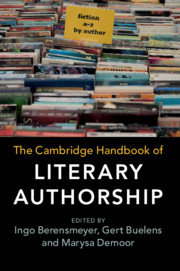Book contents
- The Cambridge Handbook of Literary Authorship
- The Cambridge Handbook of Literary Authorship
- Copyright page
- Contents
- Figures
- Contributors
- Acknowledgments
- Abbreviations
- Chapter 1 Introduction
- Part I Historical Perspectives
- Part II Systematic Perspectives
- Part III Practical Perspectives
- Chapter 20 Attribution
- Chapter 21 Anonymity and Pseudonymity
- Chapter 22 Plagiarism and Forgery
- Chapter 23 Authorship and Scholarly Editing
- Chapter 24 Copyright and Literary Property
- Chapter 25 Censorship
- Chapter 26 Publishing and Marketing
- Chapter 27 Institutions
- Select Bibliography
- Index
Chapter 27 - Institutions
Writing and Reading
from Part III - Practical Perspectives
Published online by Cambridge University Press: 07 June 2019
- The Cambridge Handbook of Literary Authorship
- The Cambridge Handbook of Literary Authorship
- Copyright page
- Contents
- Figures
- Contributors
- Acknowledgments
- Abbreviations
- Chapter 1 Introduction
- Part I Historical Perspectives
- Part II Systematic Perspectives
- Part III Practical Perspectives
- Chapter 20 Attribution
- Chapter 21 Anonymity and Pseudonymity
- Chapter 22 Plagiarism and Forgery
- Chapter 23 Authorship and Scholarly Editing
- Chapter 24 Copyright and Literary Property
- Chapter 25 Censorship
- Chapter 26 Publishing and Marketing
- Chapter 27 Institutions
- Select Bibliography
- Index
Summary
When I was a child I devoured mystery novels about the Hardy boys, two squeaky-clean teen detectives who solved surprisingly serious crimes plaguing the otherwise sleepy small town of Bayside, a fictional locale on the Atlantic coast of the United States. But eventually I learned of a crime in these novels even more shocking than the counterfeiting, smuggling, drug running, and murder that the Hardy boys routinely uncovered: the author, Franklin W. Dixon, was an imposter, a mere pseudonym for many different writers churning out titles for the Stratemeyer Syndicate, a fiction factory that mass-produced novels for children and teenagers. I felt betrayed. And foolish. Frank and Joe Hardy could sniff out an international spy ring in a week, but this ruse operated under my nose for years, and even then someone else blew the whistle on Dixon for me.
- Type
- Chapter
- Information
- The Cambridge Handbook of Literary Authorship , pp. 429 - 443Publisher: Cambridge University PressPrint publication year: 2019

